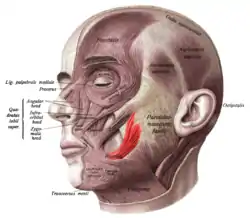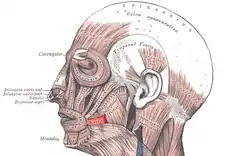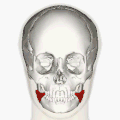Risorius
The risorius muscle is a muscle of facial expression. It arises from the fascia over the parotid gland, and inserts into the angle of the mouth. It is supplied by the facial nerve (CN VII). It may be absent or asymmetrical in some people. It retracts the angle of the mouth during smiling.
| Risorius | |
|---|---|
 Superficial muscles of the head and neck, showing the risorius in red. This version of the muscle does not match that shown in most sources. | |
 Muscles of the head, face, and neck. Risorius shown in red. This is the most standard version of the direction and origin of the muscle. | |
| Details | |
| Origin | parotid fascia |
| Insertion | modiolus |
| Artery | facial artery |
| Nerve | buccal branch of the facial nerve |
| Actions | draws back angle of mouth |
| Identifiers | |
| Latin | Musculus risorius |
| TA98 | A04.1.03.028 |
| TA2 | 2078 |
| FMA | 46838 |
| Anatomical terms of muscle | |
Structure
The risorius muscle arises in the fascia over the parotid gland. Passing horizontally forward, superficial to the platysma muscle, it inserts onto the skin at the angle of the mouth. It is a narrow bundle of fibers, broadest at its origin, but varies much in its size and form. It is superficial to the masseter muscle, partially covering it.[1]
Nerve supply
Like all muscles of facial expression, the risorius is supplied by the facial nerve (CN VII). The specific branch is debated, with some sources giving marginal mandibular branch of the facial nerve and others giving buccal branch of the facial nerve.
Development
It has been suggested that the risorius muscle is only found in Homininae (African great apes and humans).[2]
Variation
The risorius muscle may be absent in a significant minority of people, and may be asymmetrical.[3]
Function
The risorius muscle retracts the angle of the mouth to produce a smile,[4] albeit an insincere-looking one that does not involve the skin around the eyes. Compare with a real smile, which raises the lips with the action of zygomaticus major and zygomaticus minor muscles and causes "crow's feet" around the eyes using the orbicularis oculi muscles.
Additional images
 Position of risorius.
Position of risorius.
References
![]() This article incorporates text in the public domain from page 385 of the 20th edition of Gray's Anatomy (1918)
This article incorporates text in the public domain from page 385 of the 20th edition of Gray's Anatomy (1918)
- Bae, Jung-Hee; Choi, Da-Yae; Lee, Jae-Gi; Seo, Kyle K.; Tansatit, Tanvaa; Kim, Hee-Jin (December 2014). "The Risorius Muscle: Anatomic Considerations With Reference to Botulinum Neurotoxin Injection for Masseteric Hypertrophy". Dermatologic Surgery. 40 (12): 1334–1339. doi:10.1097/DSS.0000000000000223. ISSN 1076-0512.
- Page 288 in Diogo, R.; Wood, B. (2011). "Soft-tissue anatomy of the primates: Phylogenetic analyses based on the muscles of the head, neck, pectoral region and upper limb, with notes on the evolution of these muscles". Journal of Anatomy. 219 (3): 273–359. doi:10.1111/j.1469-7580.2011.01403.x. PMC 3171772. PMID 21689100.
- Waller, Bridget M.; Cray, James J.; Burrows, Anne M. (2008). "Selection for universal facial emotion". Emotion. 8 (3): 435–9. CiteSeerX 10.1.1.612.9868. doi:10.1037/1528-3542.8.3.435. PMID 18540761.
- Wilson, P. D. (2014). "Anatomy of Muscle". Reference Module in Biomedical Sciences. Elsevier. doi:10.1016/B978-0-12-801238-3.00250-6. ISBN 978-0-12-801238-3.